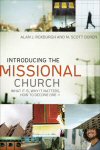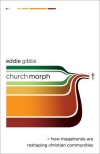Allelon Missional Series (4 vols.)
Digital Logos Edition
Overview
Allelon is “a network of missional church leaders, schools, and parachurch organizations that envisions, inspires, engages, resources, trains, and educates leaders for the church and its mission in our culture” (series preface). The Allelon Missional Series provides a thorough introduction to the missional church movement—its history, development, and importance. With a solid biblical foundation and true stories, it offers encouragement and support to church leaders seeking to be intentional in their various communities (church, small group, or neighborhood) and lays out the foundations for shaping your church around missions and creating local missional communities.
The Logos version of the Allelon Missional Series provides you with unique benefits available nowhere else. Scripture references appear on mouseover and link to your preferred translation or the original-language text. This collection fully integrates into your digital library, cross-referencing to your dictionaries, commentaries, and other reference tools and allowing you to discover what other pastors, scholars, and theologians have to say about the missional church and Christian living.
This title is included in the following collections
You can save when you purchase this product as part of a collection.
Baker Ultimate Collection 2022...
$38,273.89$30,599.99

Key Features
- Presents an introduction to the missional church movement
- Equips leaders to form missional communities
- Emphasizes Christian missional living’s biblical and spiritual importance
Product Details
- Title: Allelon Missional Series
- Series: Allelon Missional Series
- Publisher: Baker
- Volumes: 4
- Pages: 832
- Christian Group: Evangelicals
- Resource Type: Topical
- Topic: Ministry Resources
Individual Titles
- Introducing the Missional Church by Alan J. Roxburgh and M. Scott Boren
- Missional Small Groups by M. Scott Boren
- Missional: Joining God in the Neighborhood by Alan J. Roxburgh
- ChurchMorph: How Megatrends are Reshaping Christian Communities by Eddie Gibbs

Ours is a post-Christian culture, making it necessary for church leaders to think like missionaries right here at home. In Introducing the Missional Church, two leading voices in the missional movement provide an accessible introduction, explaining how the movement developed, why it’s important, and how churches can become more missional.
Roxburgh and Boren offer the clearest explication of missional thinking. I believe this book is the very best on the missional church. Highly recommended.
—Ryan Bolger, associate professor of church in contemporary culture, Fuller Theological Seminary
If you’ve ever wondered what ‘missional’ means and what real difference it makes in the life of the church, this is the place to start.
—John R. Franke, theologian in residence, First Presbyterian Church, Allentown, PA
A wonderful, imaginative exploration into what it means for the church to be missional. Roxburgh and Boren navigate through the defining issues and then give us concrete means for leading our churches through the transition. It is the book we have sorely needed.—David Fitch, B.R. Lindner Chair of Evangelical Theology, Northern Seminary
Introducing the Missional Church supplies one’s journey with God into the uncharted waters of being God’s people in a changing culture.
—C. Gene Wilkes, senior pastor, Legacy Church, Plano, TX
Alan J. Roxburgh is a teacher, trainer, and consultant who works with Allelon and framing resources for the missional church internationally. He coordinates an international project involving leaders from 12 nations who are examining leadership formation in a globalized world. He is the author or coauthor of several books, including The Missional Church, The Missional Leader and Leadership, Liminality and the Missionary Congregation, and Reaching a New Generation.
M. Scott Boren is one of the pastors at Woodland Hills Church in St. Paul, Minnesota. He is a trainer, consultant, and author of The Relational Way: How Do We Get There From Here? He works with Allelon in developing training materials on the missional church.

Small groups are a great place to connect with others, but you may wonder, is this all there is? Is sitting in a living room, talking about a book or watching a video, the extent of what we can do together? Isn’t being a Christian community about something more?
Missional Small Groups will help you see beyond the borders of your small group and into the lives of those around you so that you can make a difference. It’s filled with practical suggestions for becoming intentionally involved with your community and bringing Jesus’ message and healing to a hurting world.
Scott’s work aims to restore movement, mission, and community transformation to the heart of group life—right where it belongs!
—Bill Donahue, conference speaker, author, and leadership consultant
Wow! This one volume is the new guide for understanding missional community, being a missional community, and creating missional communities. The practical steps and phases are the genius of this book. You will walk away revisiting your paradigm of missional groups as well as the knowledge necessary to be effective in leading one.
—Rick Howerton, director of evens and training, Serendipity, LifeWay
Scott Boren is a great thinker and passionate Christ follower. In Missional Small Groups, we see those two passions align in a compelling way to serve the church. Scott has written an important book to challenge and help us bring more meaning and purpose to our small groups . . . but not for the purpose you may think. Scott knows the goal of the church is to make not simply better groups but a better world. I am confident we will see both happen as a result of Missional Small Groups.
—Bill Willits, director of group life, North Point Community Church, Alpharetta, GA
Today, amidst an abundance of small groups literature, Missional Small Groups clearly stands out. Boren provides the reader with substantive biblical and theological frameworks for understanding the ‘rhythms of small groups.’ These frameworks are insightfully used to inform the lived practices of missional small groups around communing with God, relating to one another, and engaging the world. This is a must-read for anyone interested in living out small group life within the church for the sake of the world.
—Craig Van Gelder, professor of congregational mission, Luther Seminary
Using the concepts Scott Boren presents in this book as the foundation for training and coaching leaders, I am able to cast a greater vision for small groups, groups that go about life together in a way that brings God’s kingdom here on earth. The practice lessons he includes will help groups discover and experience what missional small groups are all about.
—Ruth Kelder, ministry developer, Christian Reformed Home Missions
Scott Boren has experienced and written about small groups for the last 20 years. In Missional Small Groups, he breaks new ground by focusing on hearing the voice of God when doing small group ministry and following God’s rhythm for the group, rather than the canned model of someone else. This book will stir your creative juices to do small group ministry in a new, dynamic way.
—Joel Comiskey, president, Joel Comiskey Group
This is an important book for lead pastors and staff pastors who see their small groups as far more than a key to member retention but don’t know how to walk the small group members into a much deeper expression where missional activities happen naturally. If you enjoyed Introducing the Missional Church yet finished the book puzzled by how to become more missional, Missional Small Groups will provide the practical handles, answers, and first steps you need. I found this book to be a refreshing, energetic read.
—Randall Neighbour, president, TOUCH Outreach Ministries
M. Scott Boren is one of the pastors at Woodland Hills Church in St. Paul, Minnesota. He is a trainer, consultant, and author of The Relational Way: How Do We Get There From Here? He works with Allelon in developing training materials on the missional church.

The missional church movement is a sign that we increasingly feel the call to impact our communities, which is a good thing. But, says Alan J. Roxburgh, these conversations still prioritize church success over mission—i.e., how can being missional grow my church? But to focus on such questions misses the point.
Missional calls you to reenter your neighborhood and community to discover what the Spirit is doing there—to start with God’s mission—and join in, shaping your local church around that mission. With inspiring true stories and a solid biblical base, this is a book that will change lives and communities as its message is lived out.
The term ‘missional’ is in serious danger of becoming all things to all people and thereby signifying nothing. In this book, Alan Roxburgh offers an important corrective to this situation by providing a concrete, practical, and theologically sophisticated conception of the term in conjunction with a fresh imagination around the idea of joining God in the neighborhood for the sake of the world. This is the best book yet from one of the leading voices in the missional conversation.
—John R. Franke, theologian in residence, First Presbyterian Church, Allentown, PA
I’ve read Al Roxburgh over the years and, taking nothing away from his previous work, this is Roxburgh’s finest to date. His take on Luke 10 is compelling. Filled with stories and theological precision, this book takes us to new places for the future of Christ’s church in North America. It is sure to be a tour de force for the missional conversation. I am not being excessive when I say this book is brilliant.
—David Fitch, B. R. Lindner Chair of Evangelical Theology, Northern Seminary
Missional may well be the best yet from author Alan Roxburgh as he prophetically reclaims the Newbigin engagement of Gospel and culture as the key to rediscovering what it really means to be church. This engagement is compellingly framed in theological terms from the Luke-Acts texts as readers are deeply challenged and creatively invited to ‘join God in their neighborhoods.’ A must-read for anyone who takes seriously the challenge and opportunity facing the church in the West in light of it having lost home field advantage.
—Craig Van Gelder, professor of congregational mission, Luther Seminary
Many have undertaken to set down an orderly account of things called ‘missional,’ but Roxburgh deconstructs our modern strategic orderliness, claims we often ask the wrong questions, and lures us into Luke’s narratives. Roxburgh posits that our ‘language house,’ our whole imagination about what God is up to and how we might participate, needs to be upended through some rather odd activities like listening to neighbors and rehearing some biblical narratives.
—Mark Lau Branson, Homer Goddard Associate Professor of Ministry of the Laity, Fuller Theological Seminary
Roxburgh daringly puts the church in its place . . . literally. Missional invites us to relocate the center of missional life from churches to our places and neighborhoods. Drawing on a lifetime of missional practice and study, Roxburgh brings together missional theology with real world stories of missional practitioners. A must-read for any community seeking to live even more missionally.
—Dwight J. Friesen, associate professor of practical theology, Mars Hill Graduate School, Seattle
Alan J. Roxburgh is a teacher, trainer, and consultant who works with Allelon and framing resources for the missional church internationally. He coordinates an international project involving leaders from 12 nations who are examining leadership formation in a globalized world. He is the author or coauthor of several books, including The Missional Church, The Missional Leader and Leadership, Liminality and the Missionary Congregation, and Reaching a New Generation.

It is estimated that 80 percent of churches across the theological spectrum are either stalled or in decline. In ChurchMorph, internationally respected church observer Eddie Gibbs goes beyond an analysis of the causes to show how many churches and faith communities are actually breaking the downward trend. He expertly maps current converging church movements—emerging and missional churches, mainline renewal groups, megachurches, urban mission, new monasticism, alternative worship, and expanding networks—and offers a positive assessment of the reshaping of today’s church.
Gibbs argues that more is required of Western churches than adopting new programs if they are to missionally engage within their context. The church must re-image itself, resulting in its reconfiguration and a comprehensive change in its self-understanding; it must morph in order to be defined by its mission in the world. Gibbs identifies trends and movements that provide signs of the kingdom, reflecting on how different ecclesial communities are working out what it means to be a “church” in a post-Christendom environment. He provides a range of examples from North America and the United Kingdom to offer encouragement and assurance that God has by no means abandoned his church.
ChurchMorph is the most thorough interpretive map of church trends to come out in years. It is informed, comprehensive, and intelligently written by one of the most seasoned missionary-statesmen around today. A book well worth reading.
—Alan Hirsch, founder, Forge Mission Training Network and shapevine.com
In the midst of today’s breathtaking cultural changes, Christians in the West might be tempted to shrink back in order to survive. Eddie Gibbs refuses such a disavowal of mission. Instead, he gives us ChurchMorph, a master guidebook to the territory we all must travel in order to be church in the new post-Christendom cultures of our day. Gibbs charts both the challenges and the church movements responding to these challenges. In giving us his careful evaluations, Gibbs shows himself once again to be not only a careful scholar and a keen observer of the church but also a sorely needed prophet for these extraordinary but opportune times.
—David Fitch, B. R. Lindner Chair of Evangelical Theology, Northern Seminary
Over a long and fruitful career, Eddie Gibbs has consistently reported the most relevant on-the-ground happenings in the Western Protestant church. ChurchMorph is no exception. Utilizing his vast network of connections in the US and the UK, Gibbs has delivered to us a book that makes sense of terms like ‘emergent’ and ‘missional,’ while relentlessly challenging all Christians to be impelled outward by the gospel. This is a great resource for many Christian leaders.
—Tony Jones, theologian-in-residence, Solomon’s Porch, Minneapolis
Similar to Mark Noll’s Scandal of the Evangelical Mind and Philip Jenkins’s Next Christendom, Eddie Gibbs’s ChurchMorph is another compelling descriptive study of the changing nature of Christian communities in the West. ChurchMorph could lead to transformation in the way the Western church lives out its missional challenge in a post-Christendom world.
—S. Steve Kang, professor of educational ministries and interdisciplinary studies, Gordon-Conwell Theological Seminary
Eddie Gibbs always brings a unique perspective to church ministry. In ChurchMorph he draws on over 45 years of professional ministry involvement and 20 years of teaching at the graduate level to analyze and evaluate the role of churches in today’s complex ministry environment. I personally find his viewpoint encouraging and challenging at the same time, and I think you will too! No matter what type or style or size of church you serve, ChurchMorph will help you understand the crucial changes taking place in ministry today.
—Gary L. McIntosh, professor of Christian ministry and leadership, Talbot School of Theology, Biola University
In ChurchMorph, Eddie Gibbs describes the current challenges facing the church, given the changes in culture over the past 20 years. He offers a broad description and analysis of movements, initiatives, and networks in the UK and US that address these changes. Gibbs gives an insightful evaluation of most renewal movements today, including missional and emerging, and he offers a helpful synthesis to move the conversation forward. Not content to only explore new movements, Gibbs also examines megachurches and imagines their future. He spends just as much time on the urban contexts as suburban, looking at both established churches and the rising influence of neo-monasticism and fresh expressions of church.
—Ryan K. Bolger, assistant professor of church in contemporary culture, Fuller Theological Seminary
Eddie Gibbs (DMin, Fuller Theological Seminary) is a professor emeritus of church growth in the School of Intercultural Studies at Fuller Theological Seminary in Pasadena, California, and contributes to the Study of Emerging Churches at the Brehm Center for Worship, Theology, and the Arts. He is the author of numerous books, including Emerging Churches and ChurchNext.